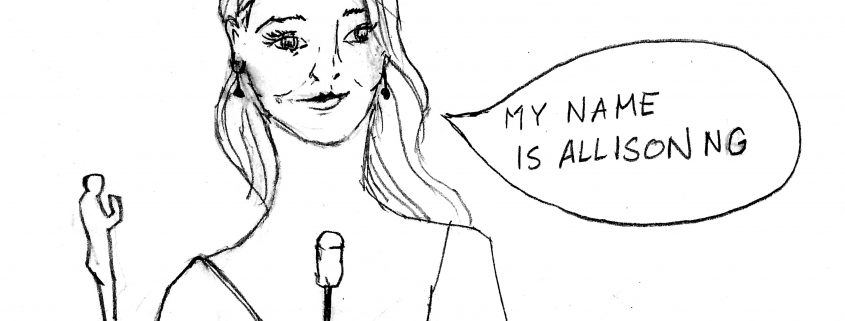COLUMN: Speeches are not enough, Hollywood
 It is oddly coincidental that President Donald Trump’s ban against immigrants from seven majority-Muslim countries took place on the same weekend as the Screen Actors Guild Awards, bringing on the full wrath of Hollywood on Sunday night. Those present at the ceremony condemned the ban in their own ways. One of my favorite protests was from Jocelyn Towne, who proudly displayed the words “Let them in” on her chest above her dress’ feathery white neckline.
It is oddly coincidental that President Donald Trump’s ban against immigrants from seven majority-Muslim countries took place on the same weekend as the Screen Actors Guild Awards, bringing on the full wrath of Hollywood on Sunday night. Those present at the ceremony condemned the ban in their own ways. One of my favorite protests was from Jocelyn Towne, who proudly displayed the words “Let them in” on her chest above her dress’ feathery white neckline.
And of course, there were the speeches. Condemnation of Trump came from every corner of the room and almost every award-winner. Notably, actress Emma Stone — no doubt feeling pressure from her fellow speech-givers — pitched in.
“We’re in a really tricky time in our world, in our country, and things are very inexcusable and scary and need action, and I’m so grateful to be part of a group of people that cares, and that wants to reflect things back to society,” Stone said.
It was this one that made me think a little. Because if people can recall, Stone was also the same actress who portrayed a woman named Allison Ng in Cameron Crowe’s 2015 film Aloha. Allison was meant to be biracial (Stone is not), and this case was one of a collection of recent controversies about the practice of whitewashing in Hollywood.
In the same league as Scarlett Johansson and Tilda Swinton, who played characters who were Asian in their films’ source material (Ghost in the Shell and Doctor Strange, respectively), Stone’s casting as Ng was an affront to Asian American actors everywhere. It doesn’t matter her level of chemistry with Bradley Cooper or even how perfectly she fit the role. What matters is that the character was written for a woman of color, and Stone took that part away.
The speech that brought down the house on Sunday night was given by David Harbour on behalf of Stranger Things, a show with a predominantly white cast. “We 1983 Midwesterners will repel bullies,” Harbour roared to the crowd’s approval. “We will shelter freaks and outcasts, those who have no home. We will get past the lies. We will hunt monsters.” Don’t get me wrong — I love a good, boiling, angry speech. I will be the first one to stand up and applaud a speech like that. But I couldn’t help struggling to make sense of Harbour’s choice of words, leaving me as confused as Winona Ryder looked. Simply, where was Harbour’s solution to all this?
Show me a direct connection between watching 1983 Midwesterners cut down supernatural monsters and Americans learning to accept and welcome marginalized people in their country. Don’t tell me that you are leading the stampede for progress when the “freaks and outcasts” you protect are predominantly white, a group that has never had to worry about the industry not being their home.
In the same vein of celebrities taking up protest, pop duo and brothers Alex and Nat Wolff sent out a tweet last Sunday applauding the protestors at John F. Kennedy International Airport, right after tweeting a promotion for the film Patriot’s Day. Alex Wolff plays Dzhokhar Tsarnaev in the retelling of the Boston Marathon bombing, a release that now seems poorly timed given Trump’s obsession with stirring up fear of foreign-born terrorists.
First, I’m not sure why the world needs to watch a fictional version of an American tragedy that stars Mark Wahlberg as the hero and further alienates Muslims in America. But for Wolff to fail to realize this and tweet out support for those protesting the Muslim ban demonstrates a disturbing cognitive dissonance that seems to permeate Hollywood across the board.
Yes, it’s a powerful thing beloved and talented people use their publicity as a platform for defending human rights and condemning federal corruption. But if it ends there, we are doomed. You can talk about equality and cut a check to the American Civil Liberties Union. You can do as Meryl Streep said and support the Hollywood Foreign Press. However, if this is the year that artists choose to become political, then it ultimately follows that their art becomes political as well. You cannot have only one, because it then becomes hypocrisy.
So when celebrities get onstage and want to talk about equality, I’m here to listen. I’m waiting in the audience with an open heart and so much hope that it hurts. But I don’t like being appeased, and I don’t like being lied to. Because the thing about being a white actor in Hollywood is that you only need to make speeches when discrimination is thrust in your face, when the country is so clearly descending into ignorance. But when the injustice of Trump’s presidency passes, what will be left? What will have changed?
On the night of the SAG Awards, this is what I heard: Support the marginalized, donate to the marginalized and defend the marginalized. But where are the marginalized on our movie screens? Where are the marginalized in this reflection of society? Where are the Asian Americans, the Latino Americans, the Muslim Americans, the Native Americans, members of the LGBT community and women who have character development outside of wanting a man? If you don’t pour the rage inside of you into your art, a mouthpiece that you know impacts and entrances millions, then what is all this talk for anyway?
No. Not acceptable. Hollywood, I’m calling you out. Look at how much power you have. Look at how many listen when you speak. Point at the evil and ignorant, but that won’t make it go away. I applaud your speeches, and I forgive your transgressions. I continue to dream of joining your ranks, but hold yourself accountable to your words. Now is the time to deliver.
Zoe Cheng is a sophomore majoring in writing for screen and television. Her column, “Wide Shot,” runs Wednesdays.


great comments! Fight on!